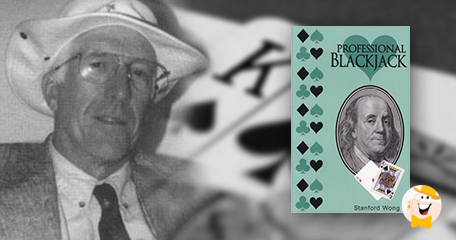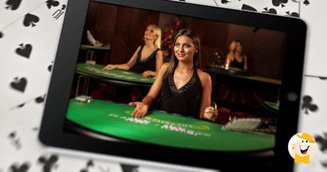
It is with great honor and respect that I am interviewing one of my heroes -- Stanford Wong. I first heard your name in 1987. At the time I was a budding 21-year-old counter playing Lawrence Revere's Plus Minus strategy. An older friend of mine advised me to forget Revere in favor of your Hi Lo count. He loaned me a hard-cover copy of Professional Blackjack. As a math major at the time, I was very impressed with the mathematical rigor of the book, and converted to the Hi Lo.
To fast forward to today, I count six of your books on my shelf and two pieces of software. My own advantage play career, and it is a stretch to call it a "career" in my case, was largely following your footsteps. From blackjack, to video poker, to tournament, to sports betting, you blazed the trail for me at every step. So, thank you for being an inspiration to me. Had it not been for you, I probably would have never became so mixed up in the world of gambling, which has served me very well.
1. According to your Wikipedia page, your pursuit of gambling began in 1964. That was not long after Beat the Dealer was published in 1962. Can you tell us about your early years as a blackjack layer Did you play more for the money or for the love of the game?
I played for the money.
2. In 1975 you published Professional Blackjack. That book introduced many blackjack players to the Hi Lo count, which I assume is the most practiced card country strategy. It also included various advanced topics and I believe the first thorough treatment of Double Exposure. When you wrote Professional Blackjack, was it your goal to write the definitive book on the game that must be on the shelf of any serious student of the game?
Not really. I created the book to bring together two things: a manuscript I had written to give to friends who asked me how to count cards, and a collection of tables of numbers I had generated that contained the expected values of various decisions the player makes. Each of those things was the size of half a book, and when I combined them the result looked like a book. So I decided to give it a title and try to sell it.
3. This question is debated to this day, but as I recall in the early 1980s many counters snubbed their noses at the simplicity of the Hi Lo in favor of more robust, and difficult to practice, card counting strategies. However, as far as I know, you have been faithful to the Hi Lo the entire time. Speaking for myself only, I find anything more complicated than the Hi Lo too difficult to use and I think I would lose more in mistakes than I would gain for the additional expected value. Did you ever face elitism in the blackjack community by those who use more powerful counts? What is the reason you didn't write about other count strategies, as some other blackjack writers did?
I did not worry about that. I presented a system that got the money. I did not intend to cover everything that could be written about blackjack.
In the early 1970s when I was working on the material that became Professional Blackjack, there was no “blackjack community.” The people interested in beating the game had no way to contact each other. The way I met people like Ken Uston and Blair Hull was running into them in a casino.
4. One term you have indirectly introduced to gambling parlance is Wong, used as a verb, to mean to jump into a blackjack game mid-shoe, in a positive count. This could be done by quietly counting the game standing behind it or through a confederate signaling the "big player" to jump in. However, I don't recall you actually using the term Wong in this way in your books. Are you proud to have a commonly-used blackjack term named after you?
I first heard the term “Wonging” used to describe the method of playing only good counts on one of my Atlantic City visits. I was chatting with some of the locals while we were waiting to for Resorts to open (it was not open 24 hours then), and I had not told them I was Stanford Wong. As soon as the doors opened, one of the locals said, “See you later. I’ve got to go Wong some tables.” I asked another local what the guy meant. He explained that blackjack author Stanford Wong advocated hopping from table to table playing just the good counts. It was humorous because he did not realize he was talking to Stanford Wong. Thus the term “Wonging” was introduced by Atlantic City blackjack players, and not by me. I thought it was neat to have a term named after me.
5. As I mentioned in the introduction, after I moved to Vegas I silently followed you around like an apprentice, trying to make a go of it as a professional gambler. One area you took me too was casino tournaments. In the early zeros decade I played numerous invitation-only blackjack, baccarat, and craps tournaments. To prepare I read your Casino Tournament Strategy book many times over, carefully analyzing each example. I also must have spent hundreds of hours playing your tournament software. According to your Wikipedia page, you were the principle operator of a team of tournament players. Can you tell me more about your time as a tournament player and running the team? Do you feel hustling tournament is still a viable advantage play today?
I wanted to write a book explaining how to play casino tournaments. But I had a problem: The material did not exist, except in the brains of those few players who had figured out how to profit from playing tournaments. So I had to figure it out for myself if I was going to write about it. I invited five friends to join me so that I could more quickly experience a wide range of tournament situations. After I finished my tournament book, I sort of lost interest in tournaments. There was still money to be made in them, but I wanted to move on to another project. I have no idea as to whether tournament play is still viable.
6. The one area you led me to where I totally jumped into the deep end is sports betting. If I may so say, the philosophy in your book Sharp Sports Betting seems to be to leave the handicapping to the pros and to exploit the exotic bets, where sometimes juicy advantages can be found. If you must bet straight up -- bet on underdogs. I've used your advice for years with such things as Wong teasers, correlated parlays, and NFL prop bets. Sadly, I've perceived advantages on the exotic bets to have diminished through the years to the point that it isn't worth bothering anymore, except maybe Super Bowl props, and even that is getting marginal. Based on what little personal conversations we have had and your forum writings, it seems to me that sports betting was a phase you went through and dropped in favor of other games. Is that an accurate assessment? Did you feel advantages were diminishing too or did you simply lose interest?
Sports betting was another thing I did just to write a book. After I finished the book, I lost interest in the subject.
7. Forgive me if it is a sensitive topic, but you know the readers won't forgive me if I don't bring up the topic of dice influence. After going some 35 years as an elder statesman of gambling, whose word was not to be questioned about anything, you ended things in what continues to be the very controversial area of dice influence. Your book Wong on Dice alleges that through a careful throw the shooter can influence the throw of the dice enough to overcome the house advantage. I hope you are not offended that I have been a skeptic of this the entire time. In fact, I lost a $2,000 bet against your side in the Little Joe challenge, if I can call it that. Dice influence is the one and only place that we part company about anything in the wide world of gambling. When Bob Dancer and I last interviewed you on Gambling with an Edge you seemed to lower the temperature on the topic, while not repudiating your earlier faith. Is that an accurate statement? What would you tell the average person seeking to pay money for lessons and invest his own time and money at the tables in pursuit of making money in craps? Please consider this an opportunity to clear the air on the topic.
My opinion on whether craps can be beaten is basically unchanged, except that I now accept that I am not one of the people who can beat the game. I am short on coordination, and now arthritis is taking its toll. I agree that the average person should not pay for lessons and should not invest time and money at crap tables in an attempt to beat the game. But if instead of an average person you are asking about a good athlete, then I’d answer that a person with exceptional coordination could learn to get an edge at craps. People I have known who have the physical gifts to beat craps have typically looked at the game and decided they would rather make money doing something else.
8. One of the most popular features of your web site, bj21.com, was the forum. I could say the same thing about my own Wizard of Vegas site. How many of your grey hairs are the result of trying to moderate and control an Internet forum? For anybody else thinking of running a gambling forum, do you have any advice on trying to balance respect for free speech while preventing trolls from turning it into a cesspool?
I have never attempted to moderate or control the forum. I did write up some suggested guidelines for posting. On the few occasions when we had a problem with improper posts, we suspended an individual’s posting privilege for a few days. If that did not solve the problem, we kicked the person out permanently.
9. Do you continue to practice any forms of advantage play on a regular basis?
I no longer play any casino games on a regular basis. But my brain still works and I still have a bankroll, so if something juicy came up I could go play it. The only thing I am lacking now is incentive. I had much more incentive to win money from casinos when I needed the money to buy things. My wife and I are comfortable enough that any money I win in the future will be spent by our kids and grandkids.
10. You just sold your web site BJ21.com to LCB. Will you continue to be involved with it? Can your fans look forward to any future books or public presence in any way?
I have no plans regarding future involvement with BJ21.com. I have no plans for future books or other public presence.
11. Aside from gambling, what are your plans going forward? Do you have a bucket list to work on and if so, what is on it?
Good question. I may be 73, but I am fit and healthy. My only problem is arthritis, and it does not slow me down much. My wife and I are trying to decide how we will spend our retirement years. So far it’s been travelling, hiking, swimming in the ocean, and playing with grandkids.
In closing, I thank you very much for your time. It was a great honor of mine to interview you.










zuga 7 years ago
7 years ago
Nice interview Mike and Mr Wong. Bit surprised by his answer about dice influence
Please enter your comment.
Your comment is added.
Mission146 7 years ago
7 years ago
Excellent interview, and thanks to both Wizard for conducting it and Mr. Wong for taking the time. I can't help but find it refreshing to read an interview with one of the greats in Advantage Play in which his answers essentially boil down to, 'It's about the money, man." There are many who treat, 'Beating the casinos,'...
Excellent interview, and thanks to both Wizard for conducting it and Mr. Wong for taking the time. I can't help but find it refreshing to read an interview with one of the greats in Advantage Play in which his answers essentially boil down to, 'It's about the money, man." There are many who treat, 'Beating the casinos,' as some sort of holy crusade, and perhaps for some it is, but in some cases I find the, "Casinos are evil for taking the money of these people, so I am going to take money from casinos even though it is the very money that they have taken from these people that enables me to take it from them," position sanctimonious. Of course, the APs in question very rarely phrase their position that way.
Show morePlease enter your comment.
Your comment is added.
AlRogers 7 years ago
7 years ago
A little-known side of Stanford Wong is that of an employer. Having worked for Stanford for about fourteen years, I had a unique perspective. He has been a great employer, business partner, close friend and trusted advisor. When we had an office in Las Vegas, his standing instructions to me were, (a) Always treat customers...
A little-known side of Stanford Wong is that of an employer. Having worked for Stanford for about fourteen years, I had a unique perspective. He has been a great employer, business partner, close friend and trusted advisor. When we had an office in Las Vegas, his standing instructions to me were, (a) Always treat customers honestly and fairly, and (b) "If you find an opportunity in a casino that needs to be acted upon quickly, lock the office and go ..." I was fortunate enough to be able to take him up on the latter several times over the years, to my own substantial benefit. Another tidbit is not widely known is "Stanford the Real Estate Investor." With me as a minority partner, in about 2009 we purchased ten Las Vegas condos near the Palms casino. Our friends and customers, all BJ21.com Green Chip members, purchased another dozen in the same complex. With our local presence, Stanford and I managed most of the condos for our friends, and were able to attain a majority on the HOA Board of Directors. With that majority, we overthrew the reign of some crooks who were running an illegal short-term rental operation there, and had them legally forced off the premises. Over several years, the rundown, mostly-vacant complex that we bought into became a sparkling, beautiful community. We posted some reports over the years on the Green Chip Stock Market & Investing Strategies page. I wish Stanford a long and happy retirement.
Show morePlease enter your comment.
Your comment is added.
LCB Admin 7 years ago
7 years ago
Great interview by one legend in the industry to another!
Please enter your comment.
Your comment is added.